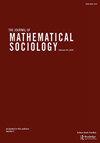时间动机理论的一个简单的、动态的扩展
IF 1.3
4区 社会学
Q3 MATHEMATICS, INTERDISCIPLINARY APPLICATIONS
引用次数: 0
摘要
时间动机理论(TMT)因其静态表征和忽视环境而受到批评。在本文中,我发展了目标抽样理论(GST)来平息这些批评,并将我们对目标选择的理解从瞬间偏好扩展到动态更新和抽样行为。GST借鉴了时间动机理论,印象形成的抽样模型,以及环境如何约束行为的组织理论,并将每个方面置于目标抽样的正式模型中。这样做解决了我们先前思维的局限性,引入了新的概念和预测,并提供了一个适合计算建模的数学框架。本文章由计算机程序翻译,如有差异,请以英文原文为准。
A simple, dynamic extension of temporal motivation theory
ABSTRACT Temporal motivation theory (TMT) has been criticized for its static representation and neglect of the environment. In this paper, I develop goal sampling theory (GST) to appease these criticisms and extend our understanding of goal choices beyond momentary preferences and into dynamic updating and sampling behavior across time. GST draws from temporal motivational theory, sampling models of impression formation, and organizational theory on how the environment constrains behavior and situates aspects of each into a formal model of goal sampling. Doing so addresses the limitations of our prior thinking, introduces new concepts and predictions, and provides a mathematical framework that lends itself to computational modeling.
求助全文
通过发布文献求助,成功后即可免费获取论文全文。
去求助
来源期刊

Journal of Mathematical Sociology
数学-数学跨学科应用
CiteScore
2.90
自引率
10.00%
发文量
5
审稿时长
>12 weeks
期刊介绍:
The goal of the Journal of Mathematical Sociology is to publish models and mathematical techniques that would likely be useful to professional sociologists. The Journal also welcomes papers of mutual interest to social scientists and other social and behavioral scientists, as well as papers by non-social scientists that may encourage fruitful connections between sociology and other disciplines. Reviews of new or developing areas of mathematics and mathematical modeling that may have significant applications in sociology will also be considered.
The Journal of Mathematical Sociology is published in association with the International Network for Social Network Analysis, the Japanese Association for Mathematical Sociology, the Mathematical Sociology Section of the American Sociological Association, and the Methodology Section of the American Sociological Association.
 求助内容:
求助内容: 应助结果提醒方式:
应助结果提醒方式:


